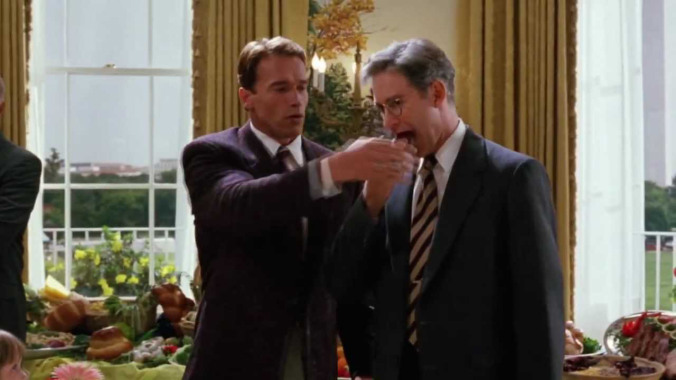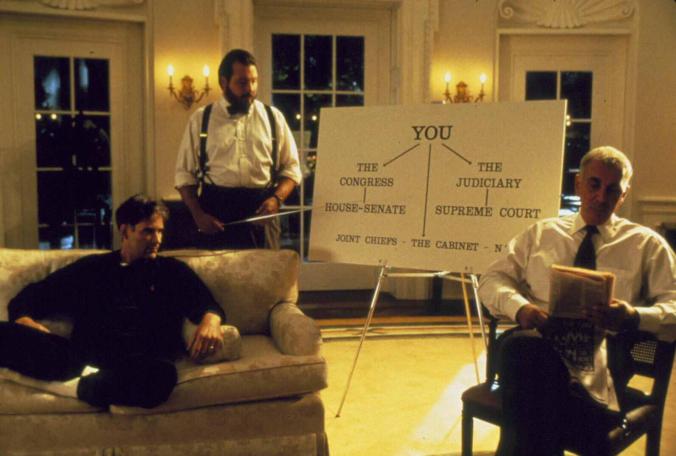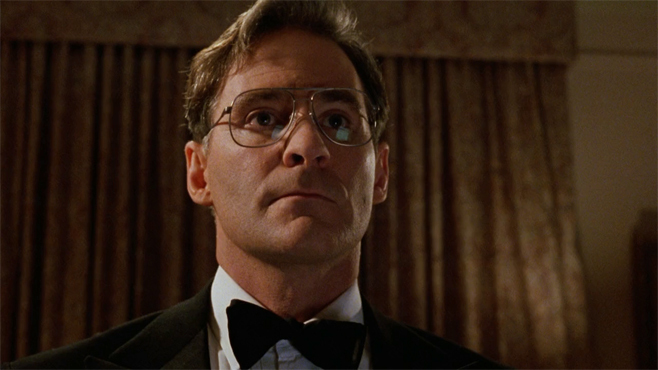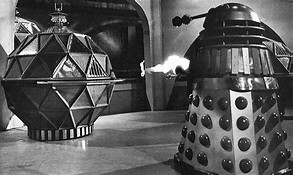Dave (1993)
Dir. Ivan Reitman
Written by: Gary Ross
Starring: Kevin Kline, Sigourney Weaver, Ving Rhames, Frank Langella
Dave is one of the movies in my collection that I have the least amount of personal history with or connection to. I’ve only owned it on Bluray for a few years, having purchased it for a few bucks to get an Amazon order above the purchase threshold for free shipping. I can vaguely remember the movie being released when I was a young kid, seven or eight years old, but I had never seen it until I was an adult. This fish out of water story is definitely an “adult” comedy, with little that would have appealed to me when it was released. It isn’t a landmark film or a masterpiece, but Dave is a better than average studio comedy, the kind of feel-good, family-friendly fare that Ivan Reitman was known for throughout the 1980s and 1990s. Solid comedic performances from a deep, star-studded cast and a somewhat fresh take on a very old narrative trope make for a pleasant viewing experience. Dave doesn’t offer any profound platitudes on the state of American politics, and it isn’t the most memorable viewing experience, but it’s a perfect light comedy to put on in the background of a lazy weekend afternoon.

Dave takes a classic story trope, the everyman thrust into a position of great power, and modernizes it. The titular Dave is Dave Kovics (Kline), who runs a temp agency in Georgetown and who is the seeming embodiment of human kindness. Dave is well liked and respected by everyone in his community, and is presented as a genuinely kind-hearted and well-meaning person. He also happens to bear a striking resemblance to the President of the United States, Bill Mitchell (also played by Kline). As such, Dave is tapped by the Secret Service to pose as the President’s body double during public events. However, when the President suffers a massive stroke while having sex with a member of his staff, White House Chief of Staff Bob Alexander (Langella) hatches a plan to replace the President with Dave, avoiding the sex scandal, and possibly setting himself up for a run at the presidency. Dave is initially, understandably, overwhelmed by his new position, but he eventually begins to acquit himself to the job. He brings his natural charm and kindness to the seat of power, befriending the First Lady (Weaver) and the head of the Secret Service (Rhames) along the way. While Dave tries to use his power to help people, he is beset by beltway insiders like Alexander, who wish to use this fortuitous situation to depose the neophyte and gain power for themselves.
Though it’s become more and more common, in 1993 the idea of a complete outsider to the political system being placed in the seat of ultimate governmental power must have seemed unusual. There are examples of course: the sitting President at the time of the film’s release, Bill Clinton, and before him Jimmy Carter, both emerged from outside the established Washington scene, but both had also served as state Governors leading up to their runs for the Presidency. Billionaire H. Ross Perot had emerged as an outsider’s voice in early 1990s Presidential politics, but he was widely viewed as a joke candidate, only afforded the legitimacy of a platform due to his extreme wealth, and rarely considered outside of the context of how many votes he could and would syphon from Republican candidates, allowing Clinton to upset incumbent George H.W. Bush in 1992. But of course, we’re talking about a pure fantasy, and, as such, Dave’s outsider politician is cut from a different cloth. He is a true everyman, more reminiscent of the protagonist from a Frank Capra film than any actual Presidential hopeful. He’s imbued with inherent goodness and a sense of patriotism that is devoted to the idealized American values of basic decency, hard work, and kindness. Dave Kovics is portrayed as a good man who is doing good work in the shadows, and positively affecting his community in ways that aren’t recognized by those who influence and enact policy. His politics are populist rather than partisan, and the film is careful to create a political fantasy where actual politics and party affiliations are largely ignored in favor of vaguely humanistic “Good vs Bad” arguments. Dave’s greatest political strength is that he spends the majority of the film steadfastly refusing to engage in actual politics. In this fictional government, Dave is able to balance the budget and save a critical human services program not by reaching across the aisle to fellow politicians, but by inviting his CPA friend, Murray (Charles Grodin), to the White House to crunch the numbers. It’s a quaint vision of a national government being run like a small business, and it’s quite at odds with the reality of American politics some 25 years later.

Of course the overwhelming optimism that the film presents is largely the product of Kline’s performance as the wide-eyed, grinning Dave. Kline plays two roles in the film, but he really doesn’t have much screen time where he’s portraying actual President Bill Mitchell. Instead, he devotes his energies to fleshing out the character of Dave Kovics, and in a way that role is a dual role in and of itself. Kline subtly adjusts his performance as the film goes on and Dave becomes more comfortable in his role as impostor President. Initially presented as outwardly emotive, expressive, and gregarious, Kline reigns in his energy as the film goes on, and Dave’s impression of the more reserved President Miller gets better and better. Still, though, Dave can’t hide his infectious goodness and sense of wonder, and Kline allows these qualities to shine through his character’s attempts to appear more professional. He keeps a small smile lingering at the corner of Dave’s lips, ready to burst wide open at the first sign of a joke. Typically better known for his comedy, Kline certainly brings a bouncy physicality to his role, and he plays up Dave’s initial discomfort with his new job as President, but he also slots in comfortably as a leading man. By film’s end, he cuts an imposing figure that communicates authority, while still maintaining the soft kindness that had earlier defined the role. I’m not overly familiar with Kline’s body of work as an actor, but in Dave he reminds me of some of Hollywood’s classic leading men. It might just be the Capra-esque qualities of the film, but watching it I was reminded of Gary Cooper.

The rest of the film’s cast is also very enjoyable to watch. Ving Rhames’s no-nonsense Secret Service agent, Duane, is hilarious as a foil for Kline’s Dave. His deadpan line delivery and massive physical presence are used to great comedic effect as he observes and silently judges the impostor President. Langella’s scheming Chief of Staff and his underling, Alan (Kevin Dunn), are appropriately slimy. Langella is the cast’s elder statesman and his characterization of Bob Alexander is reminiscent of some actual shadowy, older political string pullers who would emerge. Unfortunately, both Charles Grodin and Sigourney Weaver aren’t given a lot of material to work with. Grodin is only in a couple of scenes, but I would have appreciated more of his trademark manic anxiety as a counterbalance to Kline’s more laid back characterization of Dave. Weaver is the film’s second lead, but she’s largely reduced to a love interest for Dave. I don’t expect her to reprise her alpha-female role of Ripley in Alien, but I would hope to see some more of the verbal sparring that she’s been so adept at in her comedy work. She does get a handful of fun scenes that allow her to show some range, but it’s a shame that such a great actress doesn’t get to show off her chops in what could be a potentially meaty role. Laura Linney, Ben Kingsley, and Bonnie Hunt all show up in small roles, and have funny moments, particularly Hunt as a White House tour guide. The film is certainly not an ensemble cast, but a comedy is largely built on the performances and chemistry of its supporting cast, and Dave’s delivers admirably.
With the type of news coverage and media access that the public now has to political figures, I don’t think a movie like Dave could be made today. Its tone of wonder and whimsy definitely seems retro when compared with the modern political landscape. I don’t see very many contemporary studio comedies, so maybe the prevailing cynicism I’ve witnessed in so many people lately hasn’t crossed over into light entertainment, but I still feel that Dave is a relic from another time. It feels warm in a way that the comedies that I have seen over the last decade don’t, lacking their bite and acerbic wit. Dave’s humor is broad but also intelligent, and though it’s a movie clearly pitched towards adults, there’s almost nothing risqué in it that would make it inappropriate for kids. It’s a product of a rapidly dying monoculture. Still though, Dave’s enjoyable two hours. It will never be a go-to for me, but I like having it on my shelf. It’s a great movie to put on when you want to have a few laughs and feel good for an afternoon. Dave probably won’t make you think too hard, but it will certainly make you smile. Sometimes that’s enough.
Share this:




